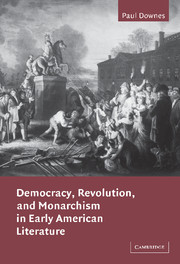Book contents
- Frontmatter
- Contents
- Preface
- Acknowledgments
- Introduction: the spell of democracy
- 1 Monarchophobia: reading the mock executions of 1776
- 2 Crèvecoeur's revolutionary loyalism
- 3 Citizen subjects: the memoirs of Stephen Burroughs and Benjamin Franklin
- 4 An epistemology of the ballot box: Brockden Brown's secrets
- 5 Luxury, effeminacy, corruption: Irving and the gender of democracy
- Afterword: the revolution's last word
- Notes
- Bibliography
- Index
Preface
Published online by Cambridge University Press: 22 September 2009
- Frontmatter
- Contents
- Preface
- Acknowledgments
- Introduction: the spell of democracy
- 1 Monarchophobia: reading the mock executions of 1776
- 2 Crèvecoeur's revolutionary loyalism
- 3 Citizen subjects: the memoirs of Stephen Burroughs and Benjamin Franklin
- 4 An epistemology of the ballot box: Brockden Brown's secrets
- 5 Luxury, effeminacy, corruption: Irving and the gender of democracy
- Afterword: the revolution's last word
- Notes
- Bibliography
- Index
Summary
This book attempts to deconstruct the revolutionary opposition between democracy and monarchism by considering some of the ways in which the democratic state and the democratic subject inherit the arcana imperii of the absolute monarch. The monarch provided Americans with a model of sovereign autonomy that might be reproduced on an individual level; but he also exemplified a self-dissolution and mystification that would be associated with everything the revolution had come to replace. This book suggests that the American Revolution initiated a democratization of the monarch's relationship to secrecy, duplicity, arbitrariness, and magisterial madness even as it redistributed the monarch's singular autonomy. The figure of the absolute monarch, I insist, is the American Revolution's constitutive other; the democracy it confronted can only be understood as a political order compelled to translate – even as it condemns – monarchism's attempts to transcend its political aporias. One of the American Revolution's most persistent claims is that it has done away with monarchism's miracles and restored an order of common sense. In the introduction to this book I will spell out at some length how we might go about undoing that claim, not in order to expose a lie, but to propose that the ideology of democratic monarchophobia undermined some of the revolution's most valuable political innovations.
- Type
- Chapter
- Information
- Publisher: Cambridge University PressPrint publication year: 2002

